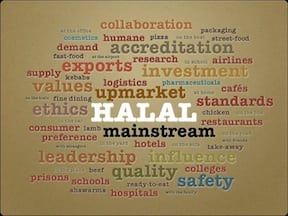By Marco Tieman
Purchasing is the professional buying by organisations. Purchasing defines the buyer-supplier relationship, also known as reverse marketing. Although much research has been conducted on the buying intention of halal products by Muslim and non-Muslim consumers, little research has been conducted on the professional buying of halal products, services, and works by organisations.
Purchasing is a critical supporting activity in a firm’s halal value chain, as purchasing guarantees all products, services, and works sourced are halal and compliant with halal certification requirements; builds, maintains and controls a sustainable supplier base with the right halal certificates and validity of halal certificates; ensures all supply chain partners contracted by the company are halal compliant enforced through contractual agreement and supplier audits; and screens halal purchase market developments, providing intelligence on the supply risk for commodity categories identified.
Professionalisation of the halal purchasing function is important as it directly contributes to the sustainability of halal sourcing, production and supply chain management. In order to protect the halal certificate and licence to operate of a company in Muslim markets, halal purchasing has become a critical success factor in professional halal business management.
Halal and food safety risks could also be better controlled when halal is anchored into the procurement strategy. This allows halal and food safety to come together. This is essential as the brand owner is accountable for both halal and food safety. Halal procurement strategy is hereby not only the responsibility of the purchasing department but also that of top management.
A focus group with food multinationals
Under the aegis of Universiti Malaya Halal Research Centre (UMHRC) a focus group discussion was conducted in 2020 with halal executives and purchasing managers from food multinationals based in Indonesia and Malaysia to identify halal procurement strategies for the food industry.
According to the focus group participants the following halal purchasing commodities are critical:
- Food ingredients
- Equipment and tools used in production
- Services and works that take place in the production facility
- Laboratory supplies (for testing)
- Primary packaging
- Water filters
- Cleaning chemicals and hand sanitisers
- Logistics services (both sourcing and distribution)
The focus group with the food industry showed that halal procurement strategies are founded on solid halal risk & reputation management. Harmonise, standardise, and simplify halal standards, halal certification bodies and halal operations. Due to the complexity of halal purchasing, food industries highlighted the importance to have backup plans for halal critical items purchasing. There is a preference for local suppliers of halal critical items. All halal critical items suppliers need to be halal certified, although this might not necessarily be required from the halal certification body. Business contingency plans of suppliers are essential to ensure that they are a robust supplier of halal critical items and are resilient in case of new halal requirements and market developments. Food industries should leverage synergy advantages within their group of companies.
Regarding the supplier-based structure and size, the participants prefer local or regional sourcing of halal critical items depending on their risk profile. Multiple sourcing, instead of single sourcing, is part of any good purchasing strategy. Regarding the substance of relationship, at the beginning of a supplier relationship of halal critical items there should be a high coordination of activities, high adaptation of resources, and high interaction of people. In a more mature relationship this changes to low coordination of activities, low adaptation of resources, and low interaction of people. Monitoring and evaluation of halal critical suppliers require a combination of vendor rating, benchmarking, and physical audits.
According to the participants there is a preference for direct process and activity collaboration only within their own group of companies; which they are already currently practicing. Indirect process and activity collaboration with other purchasing organisations outside their group of companies on the other hand is possible. Activity outsourcing however, needs to follow the processes determined by the brand owner.
The full research is published in the International Journal of Islamic Marketing and Branding (https://www.inderscience.com/jhome.php?jcode=ijimb) under the title ‘Halal procurement strategy in the food industry: a focus group discussion’.
About the Author
 Prof. Dr. Marco Tieman is the founder and Chief Executive Officer of LBB International, a supply chain strategy consultancy & research firm in the area of procurement, production, and supply chain management. He is a full professor with Help University and a research fellow with the Universiti Malaya Halal Research Centre in Malaysia, conducting research in halal purchasing, halal supply chain management, and halal risk and reputation management. He won various academic awards for his research in halal purchasing and halal supply chain management.
Prof. Dr. Marco Tieman is the founder and Chief Executive Officer of LBB International, a supply chain strategy consultancy & research firm in the area of procurement, production, and supply chain management. He is a full professor with Help University and a research fellow with the Universiti Malaya Halal Research Centre in Malaysia, conducting research in halal purchasing, halal supply chain management, and halal risk and reputation management. He won various academic awards for his research in halal purchasing and halal supply chain management.
Marco Tieman is the author of ‘Halal Business Management: a guide to achieving halal excellence’.



